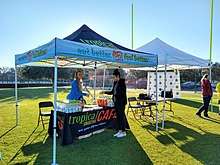Smoothie
A smoothie is a drink made from pureed raw fruit and/or vegetables, typically using a blender.[1] A smoothie often has a liquid base such as water, fruit juice, plant milk, and sometimes dairy products, such as milk, yogurt, ice cream or cottage cheese. Smoothies may be made using other ingredients, such as crushed ice, sweeteners (honey or sugar), vinegar, whey powder, chocolate or nutritional supplements, among others by personal choice.
.jpg)
Composition
.png)

As products typically using raw fruits or vegetables, smoothies include dietary fiber (e.g. pulp, skin, and seeds) and so are thicker than fruit juice, often with a consistency similar to a milkshake. Smoothies, particularly "green smoothies" that include vegetables, may be marketed to health-conscious people for being healthier than milkshakes.[2][3]
The healthfulness of a smoothie depends on its ingredients and their proportions. Many smoothies include large or multiple servings of fruits and vegetables, which are recommended in a healthy diet and intended to be a meal replacement.[2] However, fruit juice containing high amounts of sugar can increase caloric intake and promote weight gain.[4][5] Similarly, ingredients such as protein powders, sweeteners, or ice cream are often used in smoothie recipes, some of which contribute mostly to flavor and further caloric intake.[2][3]
Green smoothie
A green smoothie typically consists of 40–50% green vegetables (roughly half), usually raw green leafy vegetables, such as spinach, kale, swiss chard, collard greens, celery, parsley, or broccoli, with the remaining ingredients being mostly or entirely fruit.[6][7][8] Wheatgrass and spirulina are also used as healthful ingredients. Most green leafy vegetables have a bitter flavor when served raw, but this can be ameliorated by choosing certain less-bitter vegetables (e.g. baby spinach) or combining with certain fruit (e.g. banana softens both the flavor and texture).[9] Some blender manufacturers now specifically target their products towards making green smoothies and provide a booklet of recipes for them.[10]
If the fruit ingredients and the green vegetable ingredients are both juiced ahead of time, the mixed juice doesn't even have to be blended like a smoothie, i.e. a green juice.
Around the world
Many different smoothies are part of Indian, Mediterranean, and Middle Eastern cuisine. Fruit sharbat (a popular West and South Asian drink) sometimes include yogurt and honey, too. In India, the lassi is a smoothie or milkshake comprising crushed ice, yogurt, sugar, and mango; in the south, pineapple smoothies made with crushed ice, sugar and no yogurt are common.
Health food stores on the West Coast of the United States began selling smoothies in the 1930s associated with invention of the electric blender.[11] The actual term "smoothie" was being used in recipes and trademarks by the mid-1980s.[12]
See also
References
- "Smoothie". Oxford Dictionary, Oxford University Press. 2018.
- Jeff Olsen (26 July 2017). "Mayo Clinic Minute: Get smart about smoothies". Retrieved 25 October 2018.
- "Rethink Your Drink". Centers for Disease Control and Prevention, US Department of Health and Human Services. 23 September 2015. Retrieved 25 October 2018.
- "Get the Facts: Sugar-Sweetened Beverages and Consumption". Centers for Disease Control and Prevention, US Department of Health and Human Services. 23 October 2018. Retrieved 25 October 2018.
- Boseley, Sarah (2013-09-07). "Smoothies and fruit juices are a new risk to health, US scientists warn". The Guardian. ISSN 0261-3077. Retrieved 2016-03-27.
- Zavasta, Tonya (2009), "Smooth Moves: Enjoy the Benefit of Green Smoothies and Puddings", Raw Food and Hot Yoga, p. 39, ISBN 0-9742434-9-3,
A green smoothie...is a mixture of about 60 percent fruit and 40 percent leafy greens blended together in a delicious, nourishing beverage.
- Smith Jones, Susan (2008). Health Bliss, p.179. ISBN 1-4019-1241-9. "...about 50-60 percent fruit and 40-50 percent greens."
- Caldwell, Kim (2009) How Green Smoothies Saved My Life: A Guide for Using Green Smoothies, Uplifted Thinking, and Live Food to Enhance Your Life, p.12. ISBN 0-615-30290-4.
- "Drink your fruits and vegetables?". Harvard Heart Letter, Harvard Medical School. May 2018. Retrieved 25 October 2018.
- (Nov 2008 - Jan 2009). Organic Gardening, p.44. Vol. 56, No. 1. ISSN 1536-108X.
- Brown, Ellen (2005). The Complete Idiot's Guide to Smoothies. p. 3. ISBN 1-59257-318-5.
- "Smoothie". Online Etymology Dictionary, Douglas Harper. 2018. Retrieved 25 October 2018.
